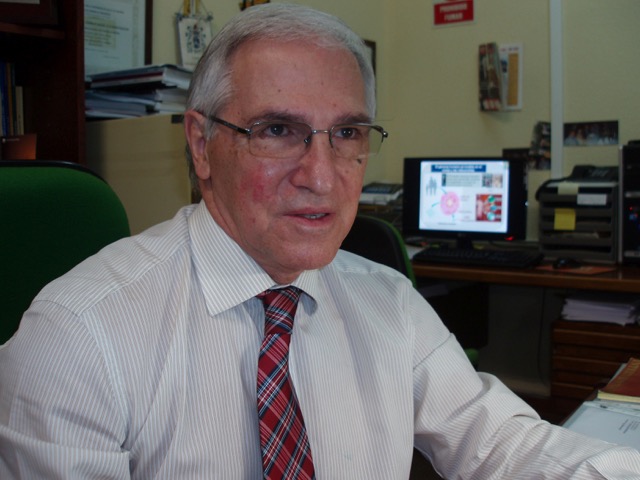In this interview with Exaudi, Dr. Nicolas Jouve de la Barreda gives readers a glimpse into the hidden value of every human life. He is Professor Emeritus of Genetics, Department of Biomedicine and Biotechnology of the University of Alcala, and President of the Association of Researchers and Professionals for Life. Science, Life, and Culture (CiViCa) describes, from the scientific point of view, the beauty and importance of the gift of life from conception, even in the midst of suffering.
Who is Dr Nicolas Jouve de la Barreda?
He is Spanish and Doctor in Biological Sciences. He did his post-graduate studies in Cambridge and, as a researcher, at the University of Missouri (Columbia). He was President of the Spanish Genetics Society. His scientific work is reflected in eight books and over 200 publications. A Consultor of the Pontifical Council for the Family, he takes part in Master’s programs, courses, conferences, and means of communication, in addition to being a member of Spain’s Bioethics Committee.
Contemporary science has revealed more to us on our biological development. Knowledge about the embryo has taken great leaps in the last decades . . . Can you mention some scientific truths, which reveal these advances, which reinforce the Yes to life?
In the last decades, science has given a series of significant data, to evaluate precisely and know well the biological material in its first stages. Life begins at the moment of what is called genetic identity is already conformed, that is, the information, the necessary instructions for a new life to develop and be identified. This happens precisely at the moment of fertilization, with the fusion of the maternal and paternal gametes, which give place to the zygote. In this act, we already have a new identity, as it is the moment in which the necessary genetic program is constituted: its own and singular genetic information, which is different from that of the parents, for the building of a new life. We could say that this is a first important fact.
The second important fact is contributed by two different disciplines of biology that are cellular biology on one hand, and the genetics of development on the other. Cellular biology describes how the formation of that new life is going to take place, that is, how the cells are being divided, how the organism is growing, at the same time the program of identity is starting, which was constituted at the moment of fertilization. In fact, the genetics of development explains how the necessary genes are expressing themselves at the appropriate moment and in each place of that embryo that is growing. There is a program that unfolds in such a way that each new cell that is formed already has an epigenome, namely, a part of the genome on the go that is different from the other parts, so that the embryo is not a simple conglomerate or accumulation of cells, as was thought some years ago.
Today we know that an embryo is a perfectly structured and directed organism. Today we know that each cell of the embryo fulfills a role in interaction with the whole. However, the whole is a unity of development in itself that builds itself with the genetic program that was fixed in the zygote. Although in a given moment external differences aren’t appreciated, as they go growing in size and more cells are produced, the differences between them increase in their contribution to the organism, without changing the starting genetic identity. In virtue of the continuity and autonomy of its development from fertilization and before or after it’s implanted in the uterus, the embryo is always the same life, the same human being, which develops little by little until birth. From fertilization to the eighth week, the embryo and the fetus – from the eighth week –, are the first phases of the development of a new human being and, in the maternal cloister, they are not part of the substantivity or of any organ of the mother, although it depends on her for its development.
Therefore, from fertilization, we are, at all times, before the same life. All this is very known today, and the way that new organism is differentiating itself and growing has been visualized in beautiful videos.
There is no doubt today for science: the big bang of life is precisely the moment of fertilization. The zygote is a new biological reality, the first corporal reality of the human being, which encloses the program of development to build, step by step, in a regular and uninterrupted way, the entity that will see the light when it reaches the degree of sufficient maturity, which in man occurs nine months after fertilization. Every human being, every person is a singular reality that begins its vital path when the genetic program is constituted of which its development will depend.
In your opinion, why — despite this evidence –, is the deliberate interruption of pregnancy continued to be presented as a woman’s right?
The why will have to be sought, of course, in reasons other than science, because the science is very clear, for all that we have said earlier. The reasons are, rather, of an ideological, cultural character, an evolution of the way of thinking for social or economic convenience, there is a whole business set up around the elimination of human life.
If we look at what happens with initial human life, in face of the right of the life of that new being that has just been conceived, the right of abortion has been imposed as a human right.
In the fight of the two values that are at stake, the right of the unborn to be born and the right of the mother to decide, have ended up by imposing abortion, for reasons of individualism, economic, cultural, and ideological convenience or relief, abortion as a woman’s right.
Translation by Virginia M. Forrester










